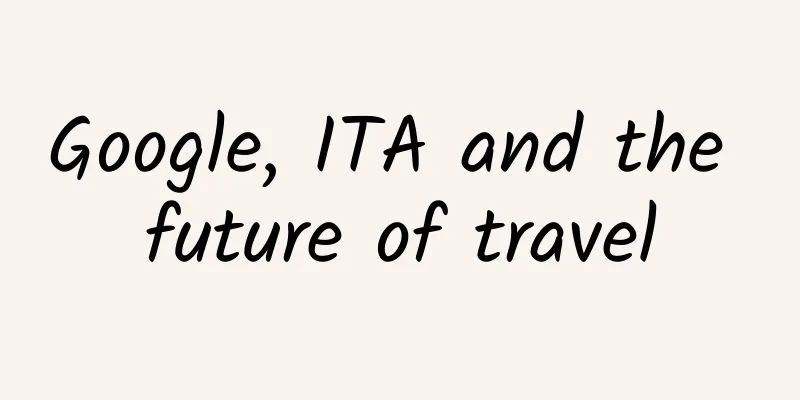Google, ITA and the future of travel

|
On the seventh floor of a building near Kendall Square, I sat down with the top Google executive in charge of travel. He was the man who had led Google's entry into the huge, competitive market for flight and hotel search, its airline reservation system, and its relationship with online travel agencies. I asked myself: What questions should I ask? What topics should we discuss first? My first question is: What is Google's vision for the travel industry? "We are relatively low-key. As you know, our motto is to let the actual product speak for itself, rather than telling consumers: 'Our product will be like this.' We prefer to say: 'We have developed such a product, try it.'" I then asked, "How is the integration between Google and ITA going? Last year, many companies opposed the deal on anti-competitive grounds, but the US Department of Justice approved the deal, allowing the former to acquire the latter for $700 million. This process must have been difficult, right?" "For ITA, we are focused on what we are doing and it is going very well. We are seeing a steady increase in the number of customers using our pricing and shopping systems. We have also launched our own reservation system. We are in discussions with several airlines about partnerships, which is an exciting process. On the consumer-facing side, we are working hard to rapidly improve Flight Search, and within a few months, ITA's products have been well integrated with Google." I asked again, “Since we’re talking about Flight Search, can you tell me about your worst airline travel experience?” He thought for a moment, then recounted in detail what happened to him in the 1980s, when he was a student at MIT. "I went home for Thanksgiving break. My family was in New York. As a student, I had to choose the lowest price. At that time, People Express, which operated out of Newark Airport, offered a low-cost flight, so I took it. When I came back from New York, I went to Newark Airport first. The flight was delayed for a while. The weather was not very good, and the plane kept circling in the air, and finally the plane was almost out of fuel. So the plane landed at the nearest airport, which was Newark Airport where we came from, and refueled. The whole trip from New York to Boston took 9 hours, and I missed all my classes on Monday." I ask this question for two reasons. First, I want to prove to readers that the senior executive in charge of Google's travel business is actually an ordinary person, but his ability is very extraordinary. Second, I want to show that because Google has been focusing on improving its search, airfare pricing, maps, mobile applications, user reviews and geolocation functions, it can also improve the entire consumer travel experience and bring in more substantial revenue for itself. The question now is, can (and how) Google provide consumers with a better travel experience? As you can probably guess by now, the executive I was interviewing was none other than Jeremy Wertheimer (pictured below), co-founder and CEO of ITA, based in Cambridge, Massachusetts. Wertheimer’s official title at Google is VP of Travel, and he reports to Jeff Huber, Google’s senior vice president of business and local business. Over the past few weeks, I have conducted in-depth interviews with Wertheimer and other executives from Google, ITA, and other companies. My goal was to understand topics such as Google and other companies’ outlook on the future of travel technology and the impact of its development trends on the travel industry and consumers, as well as to predict what technical and business problems a modern Internet giant will encounter when entering a traditional industry. (Hint: The key is to extract more information from the data, which is what Google does best.) Google and ITA one year after the transaction First, let me provide some background information. In 1996, ITA was founded by a group of people majoring in artificial intelligence at MIT (including Wertheimer). The company developed the air ticket pricing and purchase system QPX. The first company to obtain a license to use the system was Orbitz, and then many OTAs and airlines became ITA's customers, such as American Airlines, United Airlines, Kayak, TripAdvisor, and Microsoft's Bing Travel (formerly Farecast). Since 2005, ITA has begun to develop a comprehensive reservation system PSS for airlines, and in March of this year, Cape Air became the first partner of this system. In July 2010, Google announced the acquisition of ITA, but the transaction was completed after passing antitrust review, which took nearly a year. The final result of the review: For 5 years, Google must continue to provide ITA's technology to existing customers (some of which are Google's competitors); the US Department of Justice also proposed some conditions to ensure "fair" competition. Google is no stranger to the travel industry. While many people see Google's acquisition of ITA as a sign that the company is "entering the travel industry," that's not strictly accurate. Back in 2004-2005, Google launched Google Earth and Google Maps. Later, the company launched local business listings, addresses, and other information (such as street view images). Google is also committed to providing machine translation services for foreign languages, and provides user reviews of restaurants and hotels through its own platform and its acquisition of Zagat. In addition, it provides mobile-based location sharing services and public transportation schedules and data. Add to that the company's progress in mobile and social sharing technology, and you can imagine that Google will be connected to many areas in the online travel industry, and I will talk about this more below. This month, Google and ITA celebrated a year in the partnership. How have they fared? "Not very much," critics and competitors might say. Last September, Google debuted its flight search product, Google Flights, using ITA's QPX software. Reviews for Google Flights have been mixed. Users like the site's speed and simplicity, but they want more options and more airlines. Since its launch, Google has added more features, such as flights from the U.S. to more than 500 international destinations, flights to and from small regional airports, and new visualization tools. One of the company's innovations is to display the destination cities that can be reached from the user's departure city on a map, and display the lowest airfares. You can filter these prices according to departure date (or date type, such as weekends), flight type (direct flight or connecting flight) or other requirements. Wertheimer said, "This service helps consumers find the information they need in a large amount of complex data, which is constantly changing because all suppliers are optimizing every second. In addition to allowing consumers to see all the options they want to see, you also need to ensure that they are not confused by too much information." Noam Ben Haim, Google's senior product manager for flight search and travel business development, said that overall, Google provides a "completely different flight search experience." However, Google's competitors are not so positive about its new service. I spoke to a travel technology company CEO who provided the following comments on condition of anonymity. The CEO said, "I have spoken to many of the airline executives who have joined Flight Search, and they are all disappointed with the product." He added that Google's move to launch Flight Search is "clearly a plan to help the company expand in global markets" and shows that the company hopes to "drive more traffic from its organic search results." This refers to the fact that the Internet giant will display its Flight Search flight listings in the organic search results. Stephen Kaufer, CEO of Newton, Mass.-based TripAdvisor, which competes with Google for travel reviews, trip planning, and advertising, told me a few months ago that he thinks Google Flights should “stay within its means.” “ITA’s technology is great, but Google Flight Search will only be able to deliver a successful product if it has to form partnerships with airlines,” he said. Google might counter that the company has built relationships with a lot of companies in the industry over the past decade. "We've been in the travel industry for a long time, and the OTAs were very early on in Internet marketing," said Jane Butler, managing director of Google's travel advertising business. She was referring to companies like Expedia, Orbitz and Priceline, which have launched services that compete with Google's new travel products. But Orbitz has already started working with the search giant so that when consumers search on Google, they are directed to Orbitz's website to book flights. The hotel industry is also an area that Google attaches great importance to. Last summer, the company launched an experimental tool Hotel Finder. This tool allows users to search and find hotels in different cities. Before the launch of Hotel Finder, the company was committed to displaying hotel listing information on Google Maps. Google needs to cooperate with hotel suppliers to obtain information such as prices, inventory data and high-quality photos of hotels. Hotel Finder provides a very simple function: it can accurately locate a certain geographic area and neighboring areas that users search on the map. Users can accurately locate the location by dragging a quadrilateral (screenshot below). (In addition, the startup Room 77 provides hotel reservation services. Its system provides floor maps of each hotel and uses Google Earth to show consumers the view outside a room window. Will this company become a "potential acquisition target"?) Speaking of airlines, Butler said, "We want to help them reach people who are searching for flights." Currently, when people search for flights on Google, they mostly buy tickets through airline websites. Butler stressed that focusing on the end user and showing them the best travel options is "what the airline or OTA should do from the beginning." She added, "We respect their distribution decisions." Google appears to want to act as a middleman in the consumer's booking process, but the company declined to say whether it earns revenue from referral traffic or other means. In fact, Butler sees Google's development in the travel industry from a broader perspective. She said the company's real commercial potential is: "We can better connect advertisers and users by providing the most relevant information." This means that if consumers use Google during their travel process, such as through the web, mobile phones, video sharing functions (YouTube) and payment tools (Google Wallet), then the company can show consumers more precise and effective advertising. She said, "Google can use its unique advantages in every touch point of the travel research, booking, experience and sharing process." At this point, we have to return to the topic of Google's integration with ITA, because ITA is the company's main "differentiator". I asked Wertheimer this question: "What will consumers expect from the future travel experience in five years?" Wertheimer responded: "You will see that the elements of the experience will be better integrated. Today, consumers are accustomed to a relatively smooth experience. If users want to do something, many companies (Google and others) have successfully made it easier for consumers to find what they need. We will do a lot of work behind the scenes, and consumers will not be able to perceive our work from the surface. As soon as you arrive at the airport, we will know that your name is Greg, your destination city is San Francisco, and you only need to do a few important things." Wertheimer summed up his vision this way: “We want to make it as easy to plan a trip as it is to buy a book, a song, or a movie, and we want to make it as easy to execute a trip as it is to buy one of those things. That’s my goal.” Wertheimer said ITA's business, including its revenue model, is "not that different" from what it was before the acquisition. He added: "We call it 'ITA Software by Google', but we haven't really changed the business that much. Google and ITA have both gone in their own directions in the past - and we're still on the right track." However, this approach raises the question of what the future holds for the reservation system (PSS) in the ITA business, and what is Google's attitude towards it? After all, it is unlikely that Google would be willing to invest in developing software for airlines to help them run their business. However, things may not be as simple as they seem. If ITA's system (which Cape Air currently uses) becomes the backend technology for multiple airlines, what will happen to the travel technology industry? Will Google use its powerful computing and analytical capabilities to integrate flight information and fundamentally change the processes and business models of the tourism industry? From an idealistic perspective, can real-time international route and air transportation tracking systems effectively reduce flight delays and make flight scheduling more efficient? (I don't know if you have noticed that Google doesn't reveal much information about its future plans, so I made some guesses on my own.) The future of tourism lies in data Wertheimer started by saying, “A lot of people think that when you fly with Cape Air, it’s not Google that knows everything about your Cape Air flight, it’s Cape Air that knows everything about your flight. We write software for computers, and I have to make that clear that it’s Cape Air, not Google, that has a real relationship with the passenger. The passenger’s information is not stored in a larger database along with other available information. We have a lot of controls on how that data is collected and used.” Still, he said, Google could be coordinating some areas of the travel industry in smarter ways. One idea for airlines: Tracking passengers' luggage and having the airline deliver it to their hotel when they arrive. Wertheimer also mentioned a "schedule adjustment" system in ITA's flight booking software that automatically handles issues like flight cancellations and communicates with travelers via mobile phones to offer them new options. "We have very sophisticated technology that can do all the planning when problems arise: We see how these passengers' trips are affected, and we can immediately reschedule and understand what we need to do. It's a very interesting system that's designed with artificial intelligence. It's a very attractive automated system that finds and solves different problems in an intelligent way. So you definitely want more capabilities from this system. Wouldn't it be great if Google could provide this system for travel suppliers?" I'm curious how Google's acquisition of ITA will affect the company's acquisition of new airline customers. I think that although many travel sites that use ITA's pricing and purchasing software (QPX) will be concerned about unfair competition, the number of customers using ITA's airline reservation system (PSS) should increase significantly. Gianni Marostica, Google's commercial director for travel, said that although ITA's business has grown, the company is "relatively still a small company. Airlines are not sure if they want to sign a large enterprise-level agreement with a small company. But now that ITA is part of Google, the possibility of us signing cooperation agreements with other companies has increased." Gianni Marostica was previously the chief commercial officer of ITA. Google currently sells software to different airlines, but what about other modes of transportation? If the global travel market is expanding, it will be important for Google to integrate European train timetables into its system. "You want more data, and you want it to be comprehensive. We need to integrate information about trains, buses, taxis, and even mules. We definitely want to integrate all the existing information. In most cases, it depends on whether we can establish cooperation with suppliers, and we also need to make them understand that the integration of data is relevant to their business." That brings us back to the main topic of our interview: understanding Google's vision for the travel industry, where the company clearly believes the future lies in data. The first part of the topic is travel data. If you want to get from point A to point B, Google wants to provide you with all the relevant channels to plan your trip. Right now, the company provides road information for airplanes, public transportation, cars, bicycles, or walking. However, it will gradually add information on more modes of transportation, such as trains, buses, ferries, robot cars, or teleporters that have not yet been invented across cities. In addition, Google wants to provide you with services to help you plan your trip, including maps, hotels, restaurants, car rentals, packages, and information on stations along the way. To do this, Google needs to continuously collect and integrate a lot of data. (Wertheimer added that ITA has some employees dedicated to tracking information on tax rules and applicable terms to ensure that all fares are up to date and accurate.) ITA helps Google understand airfare pricing and supports its partnerships with airlines and OTAs, but the former's role in the latter is not limited to the latter. "In any expanding network, if suppliers become part of the network, the benefits they can obtain will continue to increase. I have always been optimistic. But Rome was not built in a day, and we need to invest more energy in building cooperation with suppliers and so on." The second part of the topic is user data. We pay special attention to integrating the various travel-related experiences of consumers on Google's website. Wertheimer said, "The idea is to weaken the consumer's feeling that Google has various services and integrate these processes into one experience. We will not display a prompt message like: 'You are using Google Travel now.' Assuming that you are traveling and you are using Google, it will provide you with the right information." This means that consumers do not need to type information such as "I am traveling" in the search box to get relevant travel information. Ben Haim, product manager of Google, said, "Users express their interest in travel in many ways. In the online world, people get travel inspiration and look forward to their own travel." Future challenges As Butler implies, the real money for Google is not in winning the competition with other travel search sites, nor in charging airlines or travel agencies. The real money for Google is in: getting more information about consumers' travel plans and experiences, and displaying more personalized ads and content to consumers while earning advertising revenue. As more and more consumers interact with Google through smartphones, and they also use different features (such as mobile payments and photo/video sharing), you can imagine that this strategy will become more important. In fact, for the travel industry, the competition between Google and other companies (Kayak and Fly.com) in the field of metasearch is no longer important. Metasearch refers to websites that integrate travel data, provide search services for consumers, and guide them to other websites for purchases. Michael Raybman, founder of travel website WaySavvy, said, "The relevance of metasearch has declined. Now, the core of search is more personalized search results and innovation in advertising." Of course, consumer privacy is also an important issue. Google adjusted its policy in March and now integrates user data from many of its websites and services. But some people believe that consumers can benefit in terms of price and user experience, and that many companies have exaggerated Google's anti-competitive behavior in travel search. "Google uses ITA's technology in the process of providing natural search results, which actually brings huge benefits to consumers. Consumers can get the best price through the lowest airfare search technology." The CEO of a travel technology company made the above comments anonymously. He/she has many years of experience in the aviation industry. Internally, ITA considers Google and ITA to be separate companies (although their technical cultures are very similar) that are in a customer-supplier relationship. That will change in the coming years as the two companies merge and move to new locations in Kendall Square in mid-2013. "ITA is now in the same model as it was at MIT," Wertheimer said. "Google is taking computer science and taking it to its logical conclusion." The afternoon I met with Wertheimer, he was preparing to fly to the San Francisco Bay Area. Wertheimer said he likes to park his Chevrolet Ford (a plug-in hybrid) at the airport and charge the car there. He hasn't been flying much lately and has rarely had his flights canceled (he did have one, so he took a cruise back from Alaska). My conversation with Wertheimer about the future of tourism got him thinking. He found that we have a lot of expectations for the future of tourism. “Some parts of the travel industry existed centuries before the internet. What’s interesting is that we all want to be able to go wherever we want, when we want, and arrive on time if the weather isn’t a problem. This is different from how people used to think about the world: I can get from one point to any destination in a short period of time and do it reliably.” If Google can achieve some of its goals in the travel industry, then people will have more ideas. via: traveldaily |
<<: Comparison of Amazon and Apple eBook pricing models - Infographic
>>: WorldPay: Global User Online Shopping Attitude Survey Report
Recommend
Does Dendrobium cause internal heat?
Dendrobium candidum is a very expensive Chinese m...
Can I drink saffron water during menstruation?
It is well known that saffron is a health product...
The efficacy and function of small white flower
The nutritional value of the small white flower s...
Don't give up on the checkup! These "embarrassing" physical examination items can actually detect these serious diseases
Rectal examination, stool examination, breast pal...
It’s a mess again! Is the road “long” or “slow”? Here’s what the experts say →
Is it "Therefore, Heaven will give great res...
She is rooted in isotope geochemistry and is determined to explore habitable planets outside the earth!
In the vast universe, various elements are consta...
What are the effects of chrysanthemum pollen?
Erigeron chinensis is a plant of the Asteraceae f...
Surprise! The rosy strawberries don’t taste sweet at all? The reason is…
Many people like to eat strawberries, and I like ...
The efficacy and function of golden duckweed
Friends who don’t know about duckweed will not un...
The efficacy and function of white cinnamon
Speaking of white cinnamon, I believe many friend...
How to overcome the "underwater trap" and conduct anti-mine warfare? Why do unmanned platforms have unique advantages?
Mines have the characteristics of good concealmen...
Can honeysuckle remove moisture?
Everyone knows that honeysuckle has many function...
If an electric car is not used for a long time, the battery will "starve to death"?
Audit Expert: Wang Jinlu, Director of Power Suppl...









